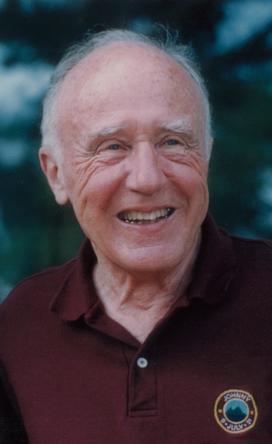I am an utterly irrational sucker for physics. Time travel (take the current arc on ABC’s Lost), quantum drama (Have you seen Michael Frayn’s play, Copenhagen, featuring Niels Bohr and Werner Heisenberg? Spectacular!), betting on the ambient frequency of various chunks of cosmic background radiation — this is my kind of thing. It probably helps explain the shrinking size of my Christmas card list.
The reason is somewhat obscure, to the extent I’m not clear myself from moment to moment. My own personal Heisenberg uncertainty. There’s probably a twinge of guilt involved; I long suspected that I helped shorten the great professor Aaron Lemonick’s life via my flailing around in Physics 103/104. There’s certainly an appeal to my yearning for process and order; the search for a Grand Unified Theory is something I can really identify with. Of course, since it eventually stymied both Einstein and John Wheeler, two of the great minds of the 20th century, that’s marginally pathetic. Some days my interest probably relates more to the magic of receiving an exquisitely detailed image of Scarlett Johansson from thousands of miles away in space.
Anyway, for a populist physics junkie, Princeton has always been the place to be. Whether Professor Joseph Henry (hired 1832, subsequently the founding head of the Smithsonian) was the greatest American physicist of the 19th century or the only true one is a semantic nicety, but you get the gist. When John C. Green, who provided mucho bucks for President James McCosh’s resuscitation of Princeton, initiated the school of science, he kicked it off in 1872 with the Joseph Henry Chair in Physics and its first incumbent, Cyrus Fogg Brackett. He in turn created the electrical engineering department (a friend of Bell and Edison, he had the first electrically lighted classroom in America) while building up physics with his protégé, William Magie 1879. Magie’s math compatriot, Henry Fine 1880, as dean of the faculty spearheaded the inclusion of science teachers among the fabled Preceptor Guys hired en masse by Woodrow Wilson 1879 in 1905.
This was successful to the degree that Einstein, during his triumphant American tour in 1921, headed straight for Princeton to lecture because the faculty there was uniquely supportive of his relatively (sorry about that) odd ideas. When he returned to the States in exile in 1933, the new Institute for Advanced Study became his hub, and physics at Princeton accelerated from the fast lane to Warp Six. Among others, Hungarian emigrants Eugene Wigner and the polymath John von Neumann subsequently came to teach their groundbreaking ideas and inspire students by the carload.
Sir Owen Richardson, brought in by Fine to jump-start research from 1906-1914 – and who opened Palmer Physics Lab – already had won a physics Nobel Prize in 1928, as did his students Arthur Compton *16 in 1927 and Clinton Davisson *11 in 1937. Edwin McMillan *32 won a chemistry Nobel in 1951 for creating new elements. Wigner’s student John Bardeen *36 won the physics prize in 1956, then Robert Hofstadter *38 in 1961. Wigner won a long-delayed Nobel in 1963, John Wheeler’s legendary student Richard Feynman *42 won in 1965, then Bardeen again in 1972 (still the only person to win two physics Nobels, but the separate discoveries – transistors and superconductivity – were so dramatic that it was impossible to deny). Professor Philip Anderson won in 1977, Stephen Weinberg *57 in 1979, professors Val Fitch and James Cronin in 1980, Dean Joseph Taylor in 1993, electrical engineering professor Daniel Tsui in 1998, professor David Gross and Frank Wilczek *74 in 2004. Along the way, a dozen people in the department have won MacArthur “genius” grants. Each has a fascinating story.
But nothing to compare with some of the folks who didn’t win.

Professor John Archibald Wheeler towers over the landscape, as a professor from 1938 to 1976 and then a highly active professor emeritus from 1986 to 2006. When he died at 96 in 2008, the worldwide accolades spilled off the pages and onto the floor. Having an oral-history interview conducted by the Niels Bohr Library is the capstone of a great physicist’s career; Wheeler did one at 55 years old – ancient for a theoretical scientist – but had to do another 26 years later. The list of those with whom he worked stuns even a casual observer: Einstein, Niels Bohr, Enrico Fermi, J. Robert Oppenheimer, Bryce DeWitt, Philip Anderson, generations of the world’s brightest.
Always a gregarious teacher, Wheeler would see his students lead departments around the globe; they include the great iconoclast Feynman, Hugh Everett *56 of “many worlds” fame, Charles Misner *57 who perceives a “mixmaster universe,” and Stephen Hawking’s wagering buddy, Kip Thorne *65. Wheeler’s ability to communicate to the world at large is fabled; he created the terms “wormhole” and “black hole” for the sake of public clarity, not to mention “geon” and “quantum foam” for you elementary-particle fans (you know who you are). He did decades of work in particle physics, nuclear fission, geometrodynamics (which he invented), the unified field theory that he inherited from Einstein, and general relativity, which he personally revived as a mainstream topic of study in the United States. Feynman’s Nobel acceptance speech includes an extended and meticulous description of how Wheeler guided him through the thicket of problems that resolved into his prize-winning quantum electrodynamics discoveries. At age 95, Wheeler still was merrily theorizing and doing interviews about the questions of “the anthropic universe,” a quantum-based idea that “man, or intelligent life, or communicating observer participators are the whole means by which the very universe is created: Without them, nothing.” Whoa. His awards, including the Wolf Prize in physics, Bohr, Franklin, Einstein and Fermi prizes, were many and huge.
But Wheeler never was awarded a Nobel. As a starry-eyed layman, I periodically asked physics cognoscenti why that was so, and I generally got that “if you were a Ph.D., you wouldn’t have to ask” look. I lately have come to suspect that they had no more idea than I did, and if anything grasped enough of the cosmos to be trulybaffled, as opposed to my simple murky confusion.
The Times of London put it rather unsatisfyingly in its laudatory obituary: “Wheeler certainly made considerable contributions to modern physics but he did not receive the credit he deserved during his lifetime [His lifetime? 96 years??]. He was one of the giant intellects of the 20th century. Many physicists believe that his pioneering work should have earned him a Nobel prize. The tendency to underrate him may have been due to some extent to his flamboyant style.”
Like what? Clarifying concepts, like substituting “black hole” for “quantum singularity”? For testing ideas like the anthropic universe at a time in life when proper scientists were collecting dust? For heaven’s sake, they gave a (highly deserved) prize to his protégé Feynman, whose biographies are entitled “Surely You’re Joking, Mr. Feynman!” and “What Do You Care What Other People Think?”
Maybe the Nobel folks somehow knew and were suspicious about the sweatshirt hanging in Wheeler’s office (even at age 95) that helpfully inquired: “What part of quantum theory don’t you understand?”
This article was published March 4, 2009.









No responses yet